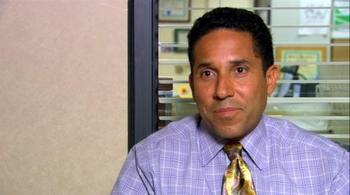Racism is also prevalent in the show. In an episode titled "Diversity Day" Michael decides to have a seminar hoping to "educate" his colleagues about different cultures. He hands each character a card with a different race written on it to place on their foreheads. Michael urges the employees to treat each other based on the race that is on their foreheads. The seminar does not go well and pokes fun at offensive stereotypes and devastating parts of some cultures' history, like slavery and the Holocaust. In Michael's interview, he states that he opted not to make a note card with Arab on it "so the meeting wouldn't be explosive." Several characters on the show regularly deal with racist remarks, including Kelly Kapoor, a Indian-American woman, and Stanley Hudson, an African-American man.
 Along with sexism and racism, there is also a homophobic culture in the Scranton branch. Oscar
Along with sexism and racism, there is also a homophobic culture in the Scranton branch. Oscar Martinez is a gay character on the show, and in the episode "Gay Witch Hunt" Michael finds out that Oscar is gay after calling him a derogatory word. Michael is curious if any other office members are homosexual and searches online for a "gaydar" after Jim jokingly mentions that they are available online. Angela, another character on the show, is open about her disapproval of homosexuality. Meanwhile, Kelly approaches Oscar and tells him that he is "so cool" for being gay. Kelly's comment, which may have had the intentions of supporting Oscar, may also be seen as offensive as it suggests that Oscar is following with some sort of trend, that he is choosing to be gay.
The Office reflects on societal issues that are present in work environments. The show uses the technique of parody to criticize today's culture and how it translates into the workplace. Although the show may seem like it is moving society backwards by decades, it is actually very progressive. The show uses parody by demonstrating the ridiculousness of discriminating by sex, race, and sexual orientation, in a comedic manner. When a character is faced with discrimination, the "jokes" come off as funny instead of offensive. The Office successfully brings attention to major problems that occur in a real life office.


I agree about how the Office uses a lot of satire. I never really realized how the show is progressive by making fun of the ridiculousness of discriminating by sex, race, and sexual orientation. This is really interesting!
ReplyDeleteThe Office is a great show! The show is such a great example of satire. The different episodes present different situations that follow along with satire.
ReplyDeleteThe Office is a great show! The show is such a great example of satire. The different episodes present different situations that follow along with satire.
ReplyDeleteThis is really well-written. I really like that you cite several examples, and I think all of them make interesting points. It'd be cool to see which specific forms of satire were used, but I think for the most part they're self-explanatory. Great job!
ReplyDelete